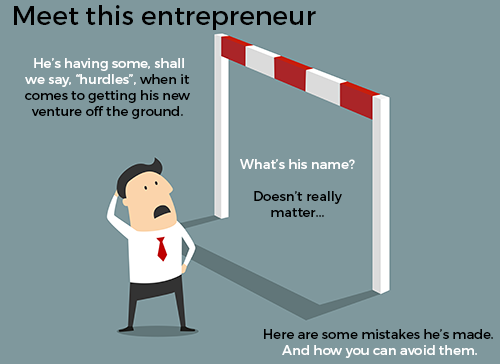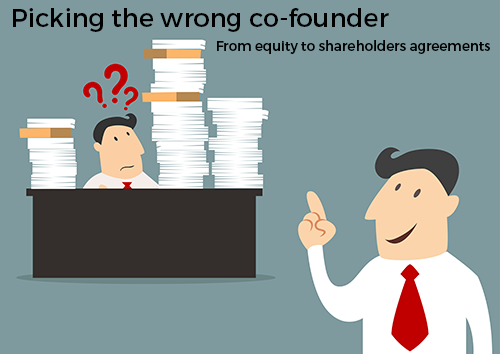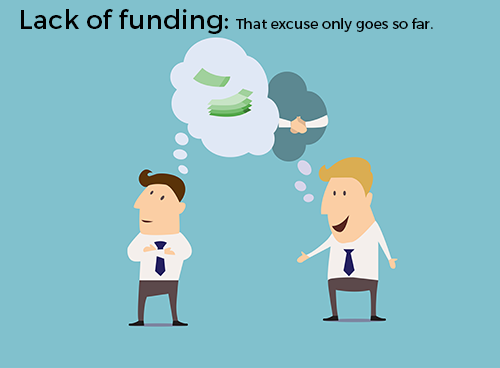
So if you’re reading this article it means that you may have made a mistake in your journey as a startup founder – and that’s totally OK. I’m glad that you’re here. Or you enjoy reading about other people’s pain, which in that case I hope you can teach those who are struggling to improve. Or maybe you are just getting into the startup game (if you are starting in my homestate, New Jersey, check out what went on in the last year).
I’m glad that you have come to read about what I’ve learned from my experiences in advising startups. Let’s see what you can learn below – and if you already know these tidbits, pass them on to a friend that’s looking to start a company.

Mistake #1 – Keeping your idea a secret
Sometimes a startup needs to go into stealth-mode to protect its intellectual property, especially if it is gunning for a patent on a particular technology. However, most of the time your idea isn’t really as proprietary or patent-able as you think.
One of the biggest misconceptions I get from founders is that their ideas need a be a secret, and if they tell me without me having signed an NDA I’m going to skip town with their idea and make millions. So what’s the reality here? You’re really shooting yourself in the foot with this one.
If you’ve spoken to investors before, you’ve probably been told that ideas aren’t worth all that much. If you can’t execute it, it’s really worth nothing. The worst part is that I understand why it’s such a rookie mistake – we were always told not to trust others, and there already is a fear of failure. Because of that fear, an entrepreneur will crave as much control as possible. It’s hard to feel like you’re in control in the beginning, so it feels comfortable to feel like you are protecting that idea and locking up your brain like Fort Knox.
Here’s the problem – not only does making people sign NDAs for no real reason annoy the heck out of most (I do know a small lot of folks that enjoy signing their names on as a many documents as possible, though), your sacrificing critical data on whether or not you are launching something that has a real product-market fit.
Solution:
Just stop being secretive, and embrace that the startup community is looking to help you out. And if you’re secretly afraid that your idea might stink, better to fail fast and reboot. Take your idea to a Startup Weekend or Lean Startup Machine and see what others think, and build it from there. And what about after you’ve gotten some traction? VCs and potential buyers have their own NDAs for you to sign (and they often don’t do special ones just for you), so the solution really is to get used to it.

Mistake #2 – Giving too much equity too early and not writing an air-tight shareholder’s agreement
So you’re at the point where you’ve realized that your co-founder was all-talk – you’re contributing the sweat equity and he’s riding off your coattails. The sad fact is that many startups fail not because of a poor product, or a lack of cash flow, it’s the drama that occurs within the founder’s circle. And why does this drama occur? Often because equity was distributed far too early without accurately assessing what each partner was going to bring to the table and not writing the proper shareholder’s agreement. And for those who offer to “advise for equity”? Don’t get me started – talk about equity once you’ve been working with them for at least a year.
Shareholder’s agreements are made for precisely the reason that your co-founder has something to prove.
Solution:
Writing an air-tight shareholder’s agreement – don’t skimp on this cost, and often people do when they don’t know how to really write one. If you have access to a great legal team, take advantage of that – if not, there are many firms that are working with startups (just ask the folks at LawTrades).
Well written shareholder’s agreements cover all of the bases – from term sheets, to vesting schedules, to what happens when a principal leaves the company. If you can establish early on the terms of when a principal leaves the company, that saves a lot of future aggravation. To learn more about shareholder’s agreements, I recommend that you read this resource from Business Insider.

Mistake #3 – Using “once we get funding…” as a crutch.
Remember the venture capitalists are constantly hedging their bets – and when they make a gamble on your startup, they are expecting that there will be a 70% chance of failure. So how do they make gobs of money to add to their portfolios? Think the other 30%. As a forward-thinker, know that being funded is not the golden ticket – it comes with its own risks and issues that you’ll pay for in the long run.
But let’s focus on the lack of funding excuse that I hear all of the time. The most successful starts that I have worked with have started with thousands of dollars, not millions, and have been able to build by not searching for funds, but by closely monitoring their cash flow.
Solution:
Realize the importance of cashflow, not just profit. Maintaining about a moving a 10-13 weekly cashflow forecast will greatly increase your chances of making it. Don’t tie your cashflow up into too many things in the beginning, and you should build yourself a very solid foundation. And if you think you’ll need to invest too much into your product? Build something else that doesn’t cost so much first! And remember the golden rule – good businesses make money.

Mistake #4 – Being so busy. Read on to see what I mean.
Do you really need to be focusing on every SaaS that you’re going to need for your startup instead of focusing on product, and most of all your customers? Being involved with every single part of the process as the founder is a mistake that will cause you to make very little progress – you’re trying to build a team for a reason. Know how to delegate, know how to manage, but do not do the small tasks that can be handed to someone else that can be trusted.
Solution:
It’s easy, really. Focus on your customers (see what Groove CEO Alex Turnbull has been doing here), develop your product, raise capital (yes, I know what I said earlier but smart capital is still something to focus on), and cash flow. Done. Oh, and remember that’s it up to you to figure out how your sales team is going to sell your product.
Any other mistakes that you’ve made in the past?
Our readers would benefit from hearing your startup stories, positive or negative. So don’t hesitate to contribute to the comments below!
 Want to learn more about what goes on in the NJ Startup ecosystem? Sign up for the Digest!
Want to learn more about what goes on in the NJ Startup ecosystem? Sign up for the Digest!
Issues come out every week, with news and stories curated by Charlie Patel and Mason Carter. Here is the signup page – it’s as simple as a click and an email. If you also have any tips on stories or would like to highlight your startup’s milestone, let us know and we will evaluate it for the Digest.
Also, if you have any other great New Jersey startup stories to share, please let us know in the comments. I would love to hear from you. You can also tweet at me @masoncarter88.
